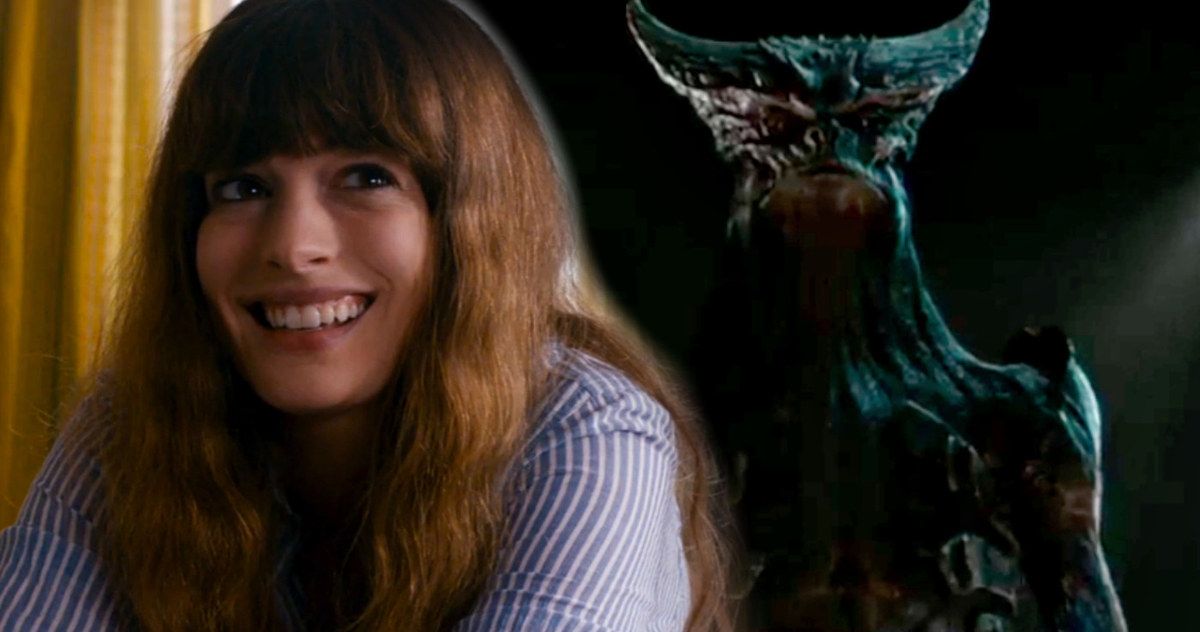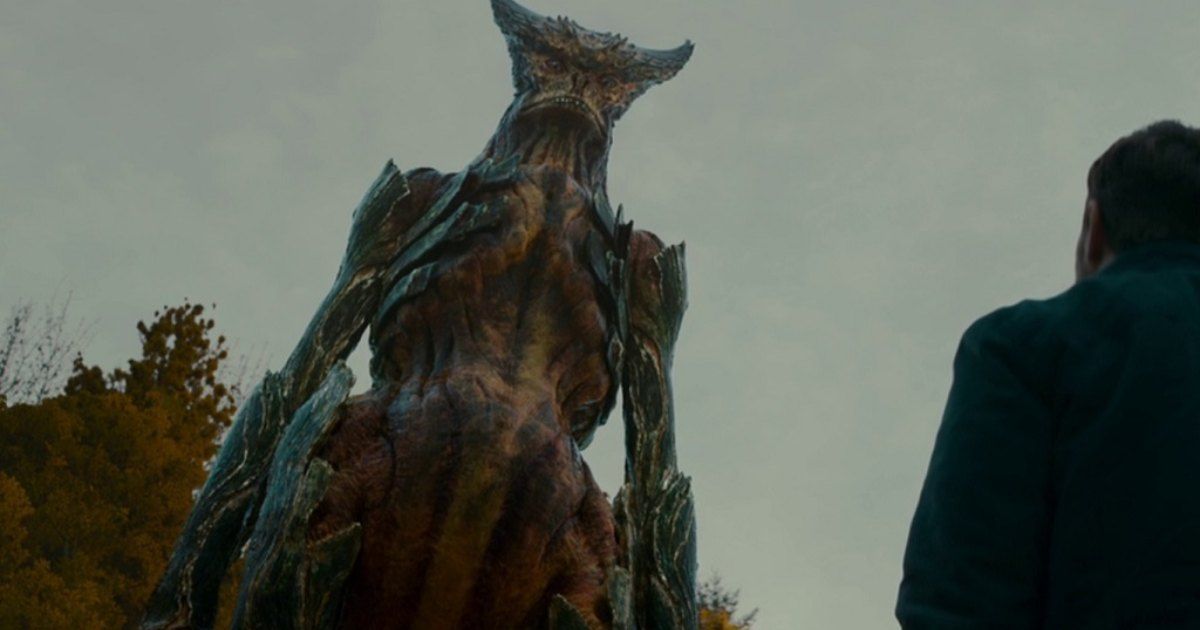Colossal is a movie unlike anything an audience has seen. Directed by Nacho Vigalondo and premiering in 2016 at the Toronto International Film Festival before getting a theatrical release in 2017, Colossal tells the story of Gloria (Anne Hathaway) an unemployed writer who is kicked out of her apartment by her boyfriend due to her excessive drinking. Gloria moves back to her old town where she reconnects with childhood friend Oscar (Jason Sudeikis), and the two begin to bond at the bar he works at.
While this would appear to begin like many low-budget character pieces or banal rom-coms, Colossal's big twist is that every time Gloria passes through a park at a certain time of day, a Kaiju (a massive monster, like Godzilla) manifests over Seoul, South Korea. To the world, what looks like a giant monster destroying the city is in reality a young woman stumbling home from the bar after a night of heavy drinking. Eventually, it is revealed that when Oscar crosses the park a giant robot also manifests as well, which leads to a conflict between the two on how they are to wield this power.
Colossal received positive reviews from critics upon its release, and one particular aspect of the film that should be praised is its depiction of addiction, particularly alcoholism and alcoholic dependencies. On the surface, one would wonder what a character study about addiction and giant kaiju monster movie would have in common to be a thematic fit, yet the filmmakers and the performers tackle the subject in a complex way by paradoxically contrasting it with an inherently silly piece of genre fiction.
The Connection Between Alcohol and the Kaiju
While the presence of a giant Kaiju in Colossal might seem out of place at first glance and an example of a random inclusion, the filmmakers use the Kaiju to express the destructive tendency of alcohol. The Kaiju mirroring Gloria's movements shows that what to her at first seems like destructive decisions only harming her doesn't just harm her, and has impacts far beyond what she realizes. The very fact that the creature manifests on the other side of the world for her literalizes the idea that a person doesn't quite realize the destructive radius of their actions and how far-reaching they can be. She begins to take responsibility when she fully grasps just how much her problem has impacted and hurt people.
The destruction that audiences typically love to see in great Kaiju films like Godzilla and King Kong here is meant to shock and horrify the audience. This is not fun (although the idea of a traditional Kaiju fight being actually two people drunkenly flailing about in a playground is meant to be a humorous subversion), as the sights and sounds of the people screaming for their lives don't come across as funny. What might seem like fun good times can, if abused, lead to damage that reaches farther than one might think and hurt people, be they loved ones or strangers. It shows how alcohol can turn someone into a monster; it's not subtle, but it is effective.
Alcoholism is a Complex Topic
Any film tackling a subject like addiction needs to walk a fine line because oftentimes, a portrayal can come off as insincere, melodramatic, or extremely judgmental. Whereas other times it can also come off as far too forgiving and justifying destructive behavior to an individual and those around them. Play it too melodramatic and it comes off as an after-school special; too glib, and it might seem dangerous or glorifying.
The movie is Gloria's story, and it is her battle with addiction that the film focuses on with an empathetic lens. One of the traits the Kaiju displays that hints to her that she might actually be the monster are a nervous tick she has where she scratches her head. This is both a clever setup to be paid off later but also a thematically rich piece of character detail. It is a nervous tick she has developed, and the first time the audience is made aware of it is when she is in the presence of alcohol. She has both an itch she needs to scratch, be it with alcohol or a literal physical one she has. She does not want to be ruled by alcohol, and at points even tries to avoid it. She tries to resist temptations but either her surroundings or even others close to her pushing it on her, she has difficulty escaping it.
In the film's final end scene, where she has a moment of victory she is immediately asked if she wants a drink, and the film cuts leaving it up for the audience to decide if she took it or not. While Gloria may have defeated a literal demon she was grappling with, the road to recovery is often a long one with fumbles, so the movie doesn't give a clear-cut ending and leaves it up to the viewer to decide what Gloria's future is. Colossal knows that there is no end-all cure for addiction, thus the phrase 'one day at a time.'
Seeds of Bitterness in Colossal
Anyone who has gone out drinking knows there are a few different types of people when they drink. There are the fun ones, the happy ones, the sad ones. Everyone has been encountered at some point. But the most dreaded one is the bitter angry one. Where alcohol strips away the facade and a person stews in their anger to lash out at others and allows their resentment to bubble over and that is perfectly displayed in Jason Sudeikis's performance as Oscar.
Oscar begins the movie seemingly as the standard 'good guy', the hometown friend who had a crush on a friend that the movie appears to be set up as the potential love interest. But as Colossal goes on, and Oscar discovers he too can manifest a giant creature the movie reveals a dark truth. Oscar is incredibly bitter about Gloria going on to have a successful life but also at everyone around him. He later turns on her when he discovers she hooked up with his friend instead of him, and all his helpful attitude towards her fades away.
While at first, he is a social drinker, having a good time the movie early on hints that anytime something doesn't go his way he will lash out. At the midpoint in the movie, he yells at all of his friends, saying words designed to hurt them. In a normal situation, a person might have held back as they would have factored into how their words might leave an impact, but the alcohol strips that way. He wields his potential for mass destruction over Gloria, threatening her to partake in drinking and staying around. He is manipulative and bitter. The alcohol does not make him this way, but it does bring out his worst tendencies. Oscar is a sharp contrast to Gloria. While both use alcohol to heal a pain they feel inside, Gloria does not intend to hurt others whereas Oscar does. He is a monster before his robot appears.




